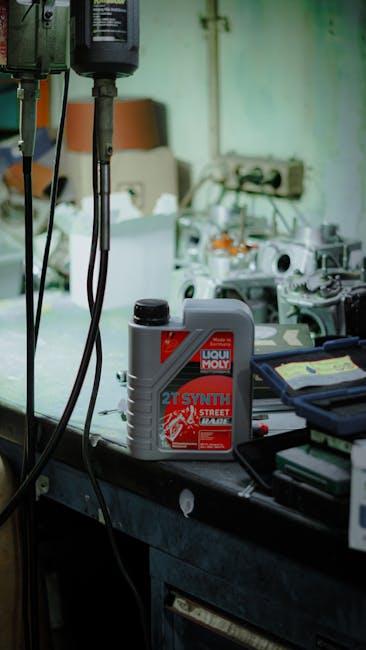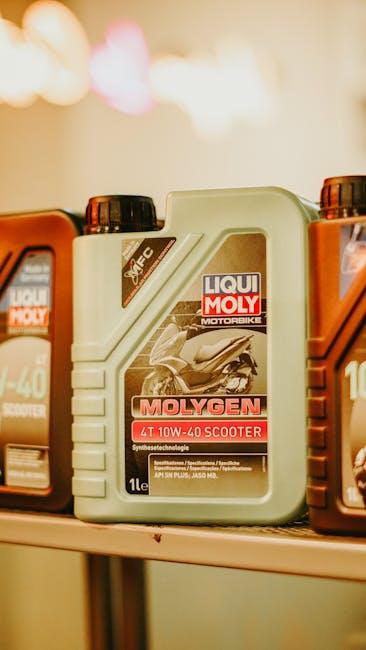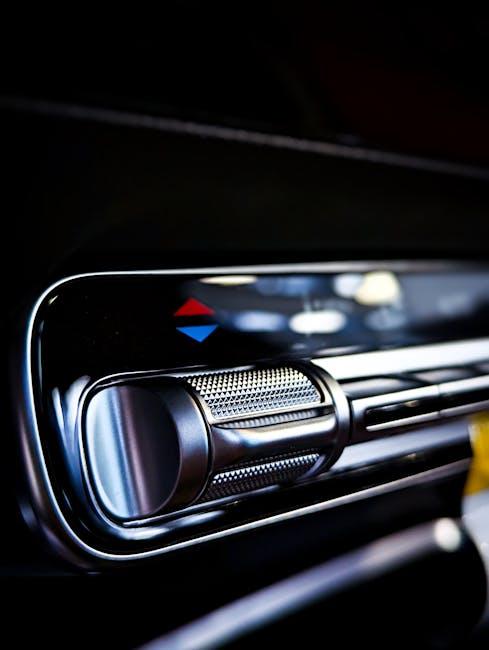In the ever-evolving world of automotive care, the debate between synthetic oil and conventional oil has sparked endless conversations among drivers, mechanics, and car enthusiasts alike. Both fluids promise to keep engines running smoothly, but with distinct compositions, performance levels, and price tags, choosing the right oil can feel like navigating a winding road without a map. In this article, we’ll journey through the science, benefits, and drawbacks of synthetic and conventional oils, helping you uncover which option truly suits your engine’s needs and driving lifestyle. Buckle up—it’s time to dive under the hood and get to the oil of the matter.
Table of Contents
- Understanding the Fundamentals of Synthetic and Conventional Oils
- Performance Differences Under Extreme Conditions
- Longevity and Engine Protection Benefits
- Cost Considerations and Value for Money
- Environmental Impact and Sustainability Factors
- Choosing the Right Oil for Your Vehicle and Driving Habits
- Q&A
- In Summary

Understanding the Fundamentals of Synthetic and Conventional Oils
Synthetic and conventional oils serve the vital role of lubricating an engine, reducing friction, and protecting vital components from wear, but they do so through fundamentally different processes. Conventional oil is refined directly from crude oil, retaining many natural impurities and requiring additives to enhance performance. In contrast, synthetic oil is engineered through a chemical process that refines and rebuilds the oil molecules, resulting in a purer, more uniform lubricant that can perform better under extreme temperatures and stress. This engineered process grants synthetic oils superior oxidation resistance and thermal stability, allowing for longer oil change intervals and better protection in harsh driving conditions.
The differences extend beyond composition to tangible performance benefits:
- Viscosity stability: Synthetic oils maintain consistent thickness regardless of temperature fluctuations, reducing engine drag and improving fuel economy.
- Engine cleanliness: Their refined nature means synthetic oils deposit fewer sludge and carbon buildups, keeping engines cleaner over time.
- Wear protection: Enhanced additives in synthetic oils form stronger protective layers, minimizing metal-to-metal contact.
| Characteristic | Conventional Oil | Synthetic Oil |
|---|---|---|
| Base Material | Crude oil refinement | Chemically engineered compounds |
| Temperature Performance | Prone to breakdown at extremes | Stable under high & low temperatures |
| Change Interval | 3,000 – 5,000 miles | 7,500 – 15,000 miles |
| Price | Lower cost | Higher upfront cost |

Performance Differences Under Extreme Conditions
When engines face extreme temperatures—whether scorching summer heat or frigid winter cold—the type of oil used can distinctly influence performance. Synthetic oils maintain their viscosity far better under temperature fluctuations, providing superior lubrication consistency that minimizes wear. This resilience ensures smoother startups in low temperatures and sustained protection at high heat levels, critical for engines subjected to harsh operational environments. Conversely, conventional oils thicken or thin more rapidly, which can compromise film strength and elevate engine stress during extreme temperature swings.
Another consideration is the oil’s behavior under intense mechanical pressure or prolonged high RPMs. Synthetic oils often contain advanced additives that combat oxidation and sludge build-up, which helps them preserve their protective qualities in demanding conditions. Below is a quick comparison showcasing the distinct advantages synthetic oil exhibits over conventional oil in extreme conditions:
| Condition | Synthetic Oil | Conventional Oil |
|---|---|---|
| High Temperature Stability | Excellent, resists breakdown | Prone to oxidation |
| Cold Start Performance | Flows quickly, reduces engine wear | Thickens, harder engine start |
| Shear Resistance | Maintains film integrity | Breaks down more easily |
| Sludge & Deposit Prevention | Advanced additive package | Less effective additives |

Longevity and Engine Protection Benefits
Synthetic oil stands out when it comes to extending your engine’s lifespan. Its advanced molecular structure allows for superior thermal stability, meaning it doesn’t break down as quickly under extreme temperatures. This resilience ensures consistent lubrication over longer intervals, protecting sensitive engine components from wear and tear. Over time, this can lead to fewer repairs, less engine sludge, and ultimately a smoother, quieter drive.
Take a look at this quick comparison of engine protection factors between synthetic and conventional oils:
| Feature | Synthetic Oil | Conventional Oil |
|---|---|---|
| Resistance to Oxidation | High | Moderate |
| Sludge Formation | Minimal | Prone |
| Temperature Tolerance | Excellent | Limited |
| Lubrication Durability | Extended | Shorter |
- Longer oil change intervals due to better endurance
- Enhanced protection against engine wear and corrosion
- Improved cold-start performance to minimize friction

Cost Considerations and Value for Money
When weighing your options, cost often plays a crucial role in the decision-making process. Synthetic oil typically commands a higher upfront price compared to conventional oil. However, this initial investment can translate into long-term savings. The enhanced durability and stability of synthetic oils mean fewer oil changes, which reduces maintenance frequency and labor costs. For drivers who cover extensive mileage or operate vehicles under extreme conditions, synthetic oil offers a level of protection that can prevent costly engine repairs down the line.
To help visualize the difference, consider this simple comparison:
| Aspect | Conventional Oil | Synthetic Oil |
|---|---|---|
| Initial Cost per Quart | $5 – $7 | $9 – $15 |
| Recommended Change Interval | 3,000 – 5,000 miles | 7,500 – 15,000 miles |
| Engine Protection | Basic | Superior |
| Overall Value | Good for budget-conscious | Best for long-term savings |
- Conventional oil: Budget-friendly upfront but requires more frequent changes.
- Synthetic oil: Higher initial cost but offers extended intervals, better engine performance, and protection.

Environmental Impact and Sustainability Factors
When evaluating lubricants through an ecological lens, synthetic oils often emerge as a more sustainable choice. Manufactured through complex chemical processes, they generally last longer and maintain engine efficiency better than conventional oils. This extended lifespan reduces the frequency of oil changes, leading to less oil waste and fewer containers entering the waste stream. Additionally, many synthetic oils are formulated to be biodegradable, which lessens their long-term environmental footprint in case of spills or improper disposal.
Nevertheless, the manufacturing process of synthetic oils typically requires more energy and involves the use of petrochemicals, which has its own environmental implications. Conversely, conventional oils are simpler to produce but often require more frequent changes, resulting in a higher cumulative consumption. Here’s a quick comparison to illustrate key sustainability factors:
| Factor | Synthetic Oil | Conventional Oil |
|---|---|---|
| Change Frequency | Longer intervals (up to 15,000 miles) | Shorter intervals (3,000-5,000 miles) |
| Biodegradability | Often biodegradable | Generally less biodegradable |
| Production Energy | Higher energy consumption | Lower energy consumption |
| Waste Generated | Less frequent oil waste | More frequent oil waste |

Choosing the Right Oil for Your Vehicle and Driving Habits
When it comes to selecting oil, understanding your vehicle’s specific needs and your driving patterns is essential. For instance, modern engines with turbochargers or those frequently driven in extreme temperatures often benefit from synthetic oils due to their superior performance in maintaining viscosity and reducing engine wear. Conversely, if your vehicle is an older model or primarily used for short, infrequent trips, conventional oil might offer sufficient protection without the higher price tag. It’s also important to consider manufacturer recommendations, as some engines are engineered with synthetic oil in mind to maximize efficiency and longevity.
Different driving habits dictate different oil requirements. Here are some key points to consider:
- Frequent stop-and-go traffic: Synthetic oil provides better protection against sludge buildup.
- Long highway drives: Conventional oil may work well but synthetic offers enhanced stability for extended periods.
- Extreme weather conditions: Synthetic oils flow better at low temperatures and resist breakdown in high heat.
- High-mileage vehicles: Synthetic blends or specialized conventional oils can help reduce leaks and oil consumption.
| Driving Condition | Recommended Oil Type | Key Benefit |
|---|---|---|
| City Traffic (Stop-and-go) | Synthetic | Better sludge resistance |
| Highway Cruising | Conventional or Synthetic | Stable viscosity |
| Cold Winters | Synthetic | Improved cold start flow |
| High Mileage | Synthetic Blend | Reduced oil consumption |
Q&A
Q&A: Synthetic Oil vs Conventional Oil – Which is Better?
Q1: What exactly are synthetic and conventional oils?
A1: Conventional oil is refined directly from crude oil, using natural processes to strip impurities. Synthetic oil, on the other hand, is engineered in labs through chemical synthesis to create uniform molecules, tailored for specific performance characteristics.
Q2: Why do people say synthetic oil is ‘better’?
A2: Synthetic oil often boasts superior performance—it flows smoothly at extreme temperatures, resists breakdown longer, and provides enhanced engine protection. This means better lubrication, reduced wear, and potentially longer intervals between oil changes.
Q3: Does that mean conventional oil is bad for my vehicle?
A3: Not at all. Conventional oil still meets industry standards and protects engines adequately for many drivers, especially those with older cars or less demanding driving conditions. It’s often more affordable and widely available.
Q4: Are there any downsides to synthetic oil?
A4: Synthetic oil tends to cost more upfront. Some older engines with certain seals might experience leaks initially, though this is less common with modern vehicles. Additionally, if your manufacturer doesn’t require synthetic oil, the extra benefits might not be essential for your driving habits.
Q5: How do I decide which oil to use?
A5: Check your vehicle’s manual for recommended oil types. Consider factors like climate, driving style, and mileage. If you drive in extreme temperatures, tow heavy loads, or want longer oil change intervals, synthetic may be worth the investment. Otherwise, conventional oil often suffices.
Q6: Can I switch between synthetic and conventional oil?
A6: Yes, modern formulations allow switching without issues. However, it’s best to drain all old oil completely during oil changes to avoid mixing. Some drivers prefer sticking to one type for consistency.
Q7: What about semi-synthetic oils? Where do they fit in?
A7: Semi-synthetic oils blend conventional and synthetic bases, offering a middle ground in price and performance. They provide better protection than conventional oils but at a lower cost than full synthetics.
Q8: In the grand oil debate, is there a clear winner?
A8: It depends. Synthetic oil offers advanced protection and performance for those who need it, while conventional oil remains a reliable, cost-effective choice for many. The ‘better’ oil aligns with your vehicle’s needs, driving demands, and budget.
Final Thought: Whether you pick synthetic or conventional oil, the key to engine longevity lies in regular changes and using quality products that match your car’s requirements. After all, even the best oil can’t do its job if left neglected!
In Summary
In the end, the choice between synthetic and conventional oil hinges on your unique driving habits, vehicle needs, and budget. While synthetic oil boasts advanced technology designed for superior protection and performance, conventional oil remains a reliable, cost-effective option for many everyday drivers. By understanding the strengths and limitations of each, you can make a well-informed decision that keeps your engine humming smoothly, mile after mile. After all, whether synthetic or conventional, the best oil is the one that suits your journey best.


315 Comments
nldi87
nldi87
zqp94l
semhcj
x3bgva
7w3pg3
We are a group of volunteers and opening a new
scheme in our community. Your site offered us with
valuable information to work on. You have done a formidable job and
our whole community will be thankful to you.
cz3fi8
u3r3a5
vt3jit
aztj7l
https://t.me/s/topslotov
ckxqcu
[https://t.me/s/official_1win_aviator](https://t.me/s/official_1win_aviator)
https://t.me/s/reiting_top10_casino/8
https://t.me/reiting_top10_casino/4
https://t.me/s/reiting_top10_casino/4
https://t.me/s/reiting_top10_casino/7
https://t.me/reiting_top10_casino
https://t.me/s/reiting_top10_casino/9
https://t.me/reiting_top10_casino/9
مولتی ویتامین اپتی من، یک مولتی ویتامین جامع
و قدرتمند است که به طور اختصاصی برای نیازهای تغذیهای آقایان، به ویژه ورزشکاران، طراحی شده است.
مولتی ویتامین اپتی من، یک مولتی ویتامین جامع
و قدرتمند است که به طور اختصاصی برای نیازهای تغذیهای آقایان، به ویژه ورزشکاران، طراحی شده است.
مولتی ویتامین اپتی من، یک مولتی ویتامین جامع
و قدرتمند است که به طور اختصاصی برای نیازهای تغذیهای آقایان، به ویژه ورزشکاران، طراحی شده است.
مولتی ویتامین اپتی من، یک مولتی ویتامین جامع
و قدرتمند است که به طور اختصاصی برای نیازهای تغذیهای آقایان، به ویژه ورزشکاران، طراحی شده است.
https://t.me/reiting_top10_casino/5
https://t.me/s/reiting_top10_casino/10
https://t.me/s/reiting_top10_casino/5
https://t.me/reiting_top10_casino/6
https://t.me/s/reiting_top10_casino/3
https://t.me/s/reiting_top10_casino
https://t.me/s/reiting_top10_casino/6
https://t.me/reiting_top10_casino/3
https://t.me/reiting_top10_casino/7
پروتئین وی ایزوله، دارای پروتئین بالا و چربی و کربوهیدرات پایینتری نسبت به سایر انواع پروتئین است.
پروتئین وی هیدرولیز، باعث میشود تا با سرعت بیشتری به هدف موردنظرکه اندامی خوش فرم است برسید.
پروتئین وی، باعث میشود تا با سرعت بیشتری به هدف موردنظرکه اندامی خوش فرم است برسید.
فیتنس مکمل، منبع بهترین مکمل های اروجینال برای افرادی است که به سلامت و زیبای اندام خود، و کیفیت و اصالت مکمل ورزشی اهمیت میدهند.
پروتئین کازئین، یکی از دو پروتئین اصلی موجود در شیر است (پروتئین دیگر، آب پنیر یا وی است).
مکمل کراتین، مکملی محبوب در دنیای بدنسازی و ورزش، ترکیبی طبیعی است که از سه اسیدآمینه آرژنین، گلایسین و متیونین در بدن تولید میشود.
مکمل پروتئین، این ماکرومغذی قدرتمند، اساس ساختار سلولها و عضلات ماست.
مکمل کراتین مونوهیدرات، یک ترکیب طبیعیه که از سه اسید آمینه گلیسین، آرژنین و متیونین ساخته میشه و به طور عمده در عضلات اسکلتی ذخیره میشه.
https://t.me/s/Gaming_1xbet
مولتی ویتامین، مکملهایی هستند که ترکیبی از ویتامینها و مواد معدنی ضروری را در یک قرص یا کپسول گرد هم میآورند.
مکمل ویتامین، مواد حیاتی ای است که بدن ما برای عملکرد صحیح به آنها نیاز دارد.
مکمل کراتین ترکیبی، مثل یه تیم فوتبال حرفهای میمونه که هر بازیکنش یه کار خاص رو به نحو احسن انجام میده.
https://t.me/s/PlayCasino_1xbet
https://t.me/s/PlayCasino_1win
https://t.me/s/PlayCasino_1win
https://t.me/s/PlayCasino_1xbet
https://t.me/s/ofitsialniy_1win/33/evith
https://t.me/s/iw_1xbet
https://t.me/s/Official_beefcasino
https://t.me/s/ofitsialniy_1win
rewx9s
https://t.me/jw_1xbet/154
https://t.me/jw_1xbet/676
https://t.me/jw_1xbet/232
https://t.me/s/jw_1xbet/109
https://t.me/jw_1xbet/734
https://t.me/s/jw_1xbet/680
https://t.me/bs_1Win/1222
https://t.me/bs_1Win/654
https://t.me/bs_1Win/983
https://t.me/s/bs_1Win/505
https://t.me/bs_1Win/434
https://t.me/s/bs_1Win/646
https://t.me/s/bs_1Win/331
https://t.me/bs_1Win/1202
https://t.me/bs_1Win/969
https://t.me/bs_1Win/968
https://t.me/bs_1Win/607
https://t.me/s/bs_1Win/1149
https://t.me/s/Official_mellstroy_casino/13
https://t.me/s/Official_mellstroy_casino/9
https://t.me/s/Beefcasino_rus/33
https://t.me/s/Official_mellstroy_casino/33
https://t.me/s/Official_mellstroy_casino/57
https://t.me/Official_mellstroy_casino/51
https://t.me/Official_mellstroy_casino/43
https://t.me/s/Official_mellstroy_casino/21
https://t.me/Official_mellstroy_casino/25
https://t.me/Official_mellstroy_casino/46
https://t.me/s/Official_mellstroy_casino/26
https://t.me/s/Official_mellstroy_casino/42
https://t.me/Official_mellstroy_casino/52
https://t.me/Official_mellstroy_casino/7
https://t.me/s/Best_promocode_rus/2663
https://t.me/Best_promocode_rus/258
https://t.me/Beefcasino_rus/57
https://t.me/ud_Pinco/53
https://t.me/ud_Izzi/55
https://t.me/ud_Fresh/51
https://t.me/ud_Fresh/54
https://t.me/s/ud_Pokerdom/56
https://t.me/ud_1xbet/64
https://t.me/s/ud_Jet/44
https://t.me/ud_Leon/61
https://t.me/ud_Izzi/50
https://t.me/ud_Pin_Up/50
https://t.me/s/ud_Rox/51
https://t.me/ud_Gama/48
https://t.me/s/ud_Kometa/62
https://t.me/s/ud_PlayFortuna/51
https://t.me/ud_Legzo/56
https://t.me/ud_Sol/58
https://t.me/s/Beefcasino_rus/59
https://t.me/s/ud_Fresh/51
https://t.me/ud_PlayFortuna/45
https://t.me/ud_CatCasino/56
https://t.me/ud_Starda/44
https://t.me/ud_Stake/45
https://t.me/ud_Lex/56
https://t.me/ud_Fresh/48
https://t.me/s/ud_Flagman/50
https://t.me/ud_Pinco/57
https://t.me/s/ud_Vodka/53
https://t.me/s/ud_Casino_X/14
https://t.me/s/ud_Martin/40
https://t.me/s/ud_Sol/12
https://t.me/s/UD_iRWIn
https://t.me/s/Ud_catcasINo
https://t.me/s/uD_1XBET
https://t.me/s/UD_LegzO
https://t.me/s/UD_VULKAN
https://t.me/s/uD_CASinO_X
https://t.me/official_1win_aviator/38
https://t.me/s/UD_lex
https://t.me/s/Ud_MRbiT
https://t.me/s/uD_soL
https://t.me/s/official_1win_aviator/69
https://t.me/s/UD_BOoI
https://t.me/s/Official_mellstroy_casino
https://t.me/s/uD_leoN
https://t.me/s/Ud_KEnT
https://t.me/s/Beefcasino_rus
https://t.me/s/uD_stArda
https://t.me/s/ud_JoycaSino
https://t.me/s/tf_1win
https://t.me/s/official_1win_aviator/60
https://t.me/s/tf_1win
https://t.me/s/tf_1win
https://t.me/s/kfo_1win
https://t.me/s/ud_jeT
https://t.me/s/UD_pIn_uP
https://t.me/s/UD_BOoi
https://t.me/s/Ud_LEX
https://t.me/s/UD_sOL
https://t.me/s/UD_gGbET
https://t.me/s/Ud_CatCasINo
https://t.me/s/ud_MOstBeT
https://t.me/s/ud_FRESh
https://t.me/s/ud_keNT
https://t.me/s/UD_DADdy
https://t.me/s/Ud_gAMa
https://t.me/s/ud_MRbIt
https://t.me/s/ke_kent
https://t.me/s/ke_DragonMoney
https://t.me/official_1win_aviator/138
https://t.me/s/ke_Martin
https://t.me/s/ke_Pokerdom
https://t.me/s/ke_1Go
https://t.me/s/ke_Drip
https://t.me/s/ke_1xbet
https://t.me/s/ke_Kometa
https://t.me/s/kef_R7
https://t.me/s/ke_Stake
https://t.me/s/ke_Leon
https://t.me/s/ke_Riobet
https://t.me/s/ke_Jet
https://t.me/s/ke_Flagman
https://t.me/s/ke_Monro
https://t.me/s/ke_Sol
https://t.me/s/ke_Fresh
https://t.me/s/ke_Irwin
https://t.me/s/ke_JoyCasino
https://t.me/s/ke_Daddy
https://t.me/s/kef_beef
https://t.me/s/ke_Starda
https://t.me/s/ke_Izzi
https://t.me/s/ke_Legzo
https://t.me/s/ke_Gama
https://t.me/s/ke_Pinco
https://t.me/s/kef_Lex
https://t.me/s/official_1win_aviator/615
https://t.me/s/ke_1Win
https://t.me/s/ke_Volna
https://t.me/s/kef_Rox
https://t.me/official_1win_aviator/285
https://t.me/s/ke_Booi
https://t.me/s/ke_1xSlots
https://t.me/s/ke_PlayFortuna
https://t.me/s/ke_MrBit
https://t.me/s/ke_mellstroy
https://t.me/s/official_1win_aviator/280
https://t.me/s/top_kazino_z
https://t.me/s/topcasino_v_rossii
https://t.me/s/a_Top_onlinecasino/19
https://t.me/s/a_Top_onlinecasino/8
https://t.me/a_Top_onlinecasino/12
https://t.me/a_Top_onlinecasino/21
https://t.me/s/a_Top_onlinecasino/15
https://t.me/a_Top_onlinecasino/10
https://t.me/s/a_Top_onlinecasino/9
https://t.me/a_Top_onlinecasino/19
https://t.me/s/a_Top_onlinecasino/21
https://t.me/topcasino_rus/
https://t.me/s/official_Riobet_es
https://t.me/s/official_Volna_es
https://t.me/s/official_Sol_ed
https://t.me/s/official_PinUp_ed
https://t.me/s/official_PlayFortuna_es
https://t.me/s/official_CasinoX_ed
https://t.me/s/official_Kent_es
https://t.me/s/official_Legzo_ed
https://t.me/s/official_Pinco_es
https://t.me/s/official_1xSlots_es
https://t.me/s/official_Legzo_es
https://t.me/s/official_DragonMoney_ed
https://t.me/s/official_Kometa_ed
https://t.me/s/official_GGBet_es
https://t.me/s/official_Flagman_es
https://t.me/s/official_Lex_es
https://t.me/s/official_Kent_ed
https://t.me/s/official_Vodka_ed
https://t.me/s/official_1xbet_es
https://t.me/s/official_1Win_es
https://t.me/s/official_MostBet_ed
https://t.me/s/official_GGBet_ed
https://t.me/s/official_Sol_es
https://t.me/iGaming_live/4554
https://t.me/s/official_JoyCasino_ed
https://t.me/?@DragonMoney_egs/7
https://t.me/s/Flagman_egs/8
https://t.me/CatCasino_egs/16
https://t.me/s/MrBit_egs/8
https://t.me/Volna_egs/12
https://t.me/s/Riobet_egs/21
https://t.me/Starda_egs/5
https://t.me/s/PlayFortuna_egs/20
https://t.me/s/JoyCasino_egs/11
https://t.me/Booi_egs/7
https://t.me/s/Kometa_egs/17
https://t.me/s/Lex_egs/13
https://t.me/s/Vulkan_egs/14
https://t.me/s/Irwin_egs/4
https://t.me/s/Kent_egs/4
https://t.me/R7_egs/15
https://t.me/s/Pinco_egs/6
https://t.me/s/CasinoX_egs/12
https://t.me/Leon_egs/4
https://t.me/s/Kometa_egs/11
https://t.me/s/GGBet_egs/7
https://t.me/MostBet_egs/22
https://t.me/Kometa_egs/13
https://t.me/s/Legzo_egs/18
https://t.me/GGBet_egs/18
https://t.me/s/iGaming_live/4719
https://t.me/va_1xbet/14
https://t.me/va_1xbet/3
https://t.me/s/va_1xbet/6
https://t.me/va_1xbet/21
https://t.me/s/va_1xbet/19
https://t.me/va_1xbet/24
https://t.me/s/va_1xbet/15
https://t.me/s/va_1xbet/14
https://t.me/s/surgut_narashchivaniye_nogtey/16
https://t.me/surgut_narashchivaniye_nogtey/12
https://t.me/s/surgut_narashchivaniye_nogtey/3
https://t.me/s/rating_online
https://t.me/ah_1xbet/2
https://t.me/s/ah_1xbet/8
https://t.me/ah_1xbet/8
https://t.me/s/ah_1xbet/21
https://t.me/ah_1xbet/9
https://t.me/ah_1xbet/15
https://t.me/s/ah_1xbet/4
https://t.me/s/ah_1xbet/10
https://t.me/ah_1xbet/19
https://t.me/s/ah_1xbet/3
https://t.me/s/Best_rating_casino
https://t.me/reyting_topcazino/18
https://t.me/topcasino_rus/
https://t.me/a_Topcasino/3
https://t.me/top_ratingcasino/4
https://t.me/top_ratingcasino/9
https://t.me/a_Topcasino/4
https://t.me/a_Topcasino/5
https://telegra.ph/Top-kazino-11-14-2
https://t.me/kazino_bez_filtrov
https://t.me/da_1xbet/9
https://t.me/da_1xbet/13
https://t.me/da_1xbet/4
https://t.me/da_1xbet/7
https://t.me/da_1xbet/11
https://t.me/da_1xbet/8
https://t.me/Best_promocode_rus/2435
https://t.me/da_1xbet/15
https://t.me/da_1xbet/10
https://t.me/rq_1xbet/872
https://t.me/rq_1xbet/1195
https://t.me/rq_1xbet/794
https://t.me/s/rq_1xbet/765
https://t.me/s/rq_1xbet/777
https://t.me/s/rq_1xbet/1254
https://t.me/s/rq_1xbet/727
https://t.me/s/rq_1xbet/647
https://t.me/Official_1xbet1/1055
https://t.me/Official_1xbet1/644
https://t.me/Official_1xbet1/1366
https://t.me/Official_1xbet1/333
https://t.me/s/Official_1xbet1/631
https://t.me/Official_1xbet1/336
https://t.me/Official_1xbet1/893
https://t.me/Official_1xbet1/261